Quick answer: The Best Encrypted Messaging App in 2025 is Signal!
Data theft is no joke. After the events and the secrets revealed by Snowden, it has become clear that you cannot trust anyone with your data, even your government.
In today’s world, where instant messaging became the norm in communication, you cannot just use any app you find on the market, especially when there are hundreds of them out there. If you’re one to pick your phone, be it Android or iOS, countless times throughout the day, choosing an encrypted messaging app is crucial to protect your privacy. In this article, we will go through the best encrypted messaging apps for Android and iOS, both paid and free, for the leading mobile operating systems, as well as the best paths to take to further safeguard your conversations.
NOTE: Make sure no one is able to read your messages by encrypting your traffic with a VPN. See our list of recommended VPN-services.
1. Best encrypted messaging apps in 2025
1.1 Signal
Signal stands out as an excellent choice for an encrypted messaging app due to several key features and benefits:
-
Strong Encryption: Signal is renowned for its state-of-the-art encryption technologies. The app employs end-to-end encryption for all communications, ensuring that only the sender and receiver can access the messages. This level of security is crucial for users who prioritize privacy in their communications.
-
Open Source Code: The open-source nature of Signal allows for transparency and regular scrutiny by the global developer community. This approach not only helps in identifying and fixing potential bugs and vulnerabilities but also builds trust among users about the app’s security measures.
-
Comprehensive Messaging Features: Despite its focus on security, Signal does not compromise on functionality. It offers a full range of messaging features, including text chats, group chats, file sharing, voice and video calls, and disappearing messages. This makes it a versatile app for various communication needs.
-
Free to Use: Signal is completely free, making it accessible to a wide range of users. The lack of any subscription or usage fees is a significant advantage for individuals and organizations looking to secure their communications without additional costs.
-
SMS Integration: The app allows users to receive SMS texts directly in Signal. However, it’s important to note that SMS messages are only encrypted if both parties are using Signal, a limitation users should be aware of.
-
Privacy-Focused: Signal’s primary focus is on user privacy and security. It does not store metadata and minimizes data collection, making it a top choice for users who are concerned about their digital privacy.
However, there are some limitations:
- Basic User Interface: Compared to other messaging apps like WhatsApp and Messenger, Signal has a more basic and plain user interface. While this may not affect functionality, users who prefer a more modern or aesthetically pleasing design might find Signal less appealing.
In summary, Signal is an excellent encrypted messaging app for users who prioritize security and privacy in their digital communications. Its strong encryption, open-source code, and range of messaging features make it a top choice in the encrypted messaging space. While its user interface may be basic compared to some competitors, this does not detract from its effectiveness as a secure communication tool.
1.2 WhatsApp
WhatsApp is a widely used encrypted messaging app with several features that contribute to its popularity:
-
End-to-End Encryption: One of the key strengths of WhatsApp is its end-to-end encryption for all communications, introduced in 2016. This ensures that messages can only be read by the sender and the recipient, significantly enhancing privacy and security.
-
Cross-Platform Availability: WhatsApp is available for both Android and iOS devices, making it accessible to a vast majority of smartphone users. This wide availability contributes to its large user base.
-
User-Friendly Interface: The app features a beautiful and simple design, making it easy for users of all ages and technical backgrounds to navigate and use effectively.
-
Advanced Messaging Features: WhatsApp offers a comprehensive range of messaging features, including text messaging, group chats, voice and video calls, file sharing, and contact sharing. This versatility makes it suitable for both personal and professional communication.
-
No Cost for Usage: The app is free to use, which is a significant advantage for users who want a full-featured messaging app without any subscription fees.
-
Local Storage of Conversations: While this can be a double-edged sword, local storage of conversations means that your chat history is not stored on WhatsApp’s servers, which can be seen as an additional privacy measure.
However, there are some drawbacks:
-
Local Conversation Storage Challenges: The fact that conversations are stored locally can make backing up and restoring them challenging, especially when switching devices or if the device is lost or damaged.
-
Ownership by Facebook: Facebook’s ownership of WhatsApp raises concerns for some users about the potential for data sharing between WhatsApp and Facebook, despite the encryption. This concern is particularly relevant for users who are cautious about their data privacy in the context of large tech companies.
In summary, WhatsApp is a strong contender in the encrypted messaging app space due to its end-to-end encryption, ease of use, wide availability, and comprehensive messaging features. However, the challenges with local storage of conversations and concerns regarding its ownership by Facebook are factors that users may want to consider.
1.3 Telegram
Telegram is a popular encrypted messaging app known for its strong focus on security and privacy, along with a range of user-friendly features:
-
End-to-End Encryption: Telegram uses the latest end-to-end encryption technologies to secure communications. This ensures that messages can only be read by the sender and intended recipient, protecting data from unauthorized access.
-
Cross-Platform Availability: Available on both iOS and Android platforms, Telegram caters to a wide user base. This cross-platform availability makes it accessible to a vast majority of smartphone users.
-
Secret Chats Feature: One of Telegram’s distinctive features is its “Secret Chats” mode, which allows users to have conversations that are encrypted end-to-end and can be set to self-destruct after a certain period. This feature offers an additional layer of privacy and is particularly valued by those seeking confidential communication.
-
Self-Destructing Messages: Telegram allows users to send messages, photos, and videos that automatically delete after being viewed. This “disappearing messages” feature adds to the app’s focus on privacy and secure data handling.
-
No Server Storage of Conversations: Similar to WhatsApp, Telegram does not store conversations on its servers, meaning that deleting them from the mobile device effectively removes them permanently, enhancing user privacy.
-
Feature-Rich and Free to Use: Telegram offers a wide range of features, including group chats, file sharing, custom stickers, and bots, all available without any charge. The app’s functionality extends beyond basic messaging, making it versatile for various use cases.
-
Encryption for Texts and Voice Calls: The app provides end-to-end encryption not just for text messages but also for voice calls, ensuring secure and private communication in different formats.
Despite these advantages, it’s important to note:
-
Encryption Not Default for All Chats: End-to-end encryption is not enabled by default for all chats; it is specific to the “Secret Chats” feature. Regular chats on Telegram use client-server encryption and are stored encrypted on Telegram’s servers.
-
Potential for Controversial Use: Due to its strong encryption and privacy features, Telegram has sometimes been associated with controversial uses, such as by individuals or groups seeking to avoid government scrutiny.
In summary, Telegram is a comprehensive and secure messaging app, appreciated for its privacy-focused features like end-to-end encryption, secret chats, and self-destructing messages. It’s a strong choice for users who prioritize security in their communications, though it’s important to be aware of its encryption settings and potential controversial uses.
1.4 Facebook Messenger
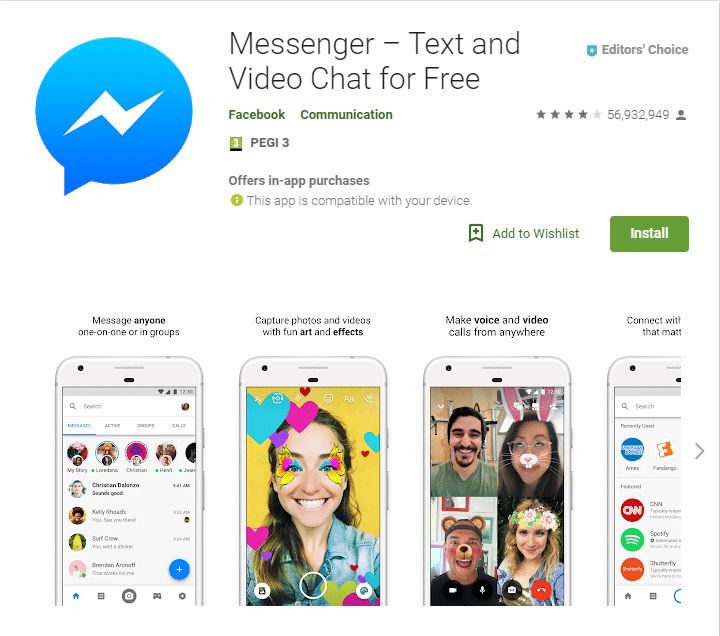
Facebook Messenger, while not primarily known for its encryption capabilities, does offer features that make it a strong contender in the encrypted messaging app space, especially for users who prioritize a feature-rich experience:
-
Optional End-to-End Encryption: Messenger includes an end-to-end encryption option, known as “Secret Conversations,” which can be activated for private chats. This encryption ensures that messages can only be read by the sender and the recipient, providing a secure communication channel.
-
Rich Feature Set: Facebook Messenger is known for its wide array of features. It supports text chats, voice and video calls, group chats, file sharing, and even in-app games and bots. This range of functionalities makes it versatile for both personal and casual business communications.
-
Free and Ubiquitous: The app is free to use and is one of the most widely used messaging platforms globally, making it easy to connect with a vast network of users.
-
Integration with Facebook’s Ecosystem: For users already engaged with Facebook’s ecosystem, Messenger offers seamless integration with other Facebook services, enhancing the overall user experience.
-
SMS Support: Messenger can also be used to send and receive SMS texts, consolidating messaging needs into a single app.
However, there are significant drawbacks:
-
Encryption Not Default: Unlike some other messaging apps, end-to-end encryption is not the default setting in Messenger. Users must actively choose to use “Secret Conversations” to enable encryption, which might be overlooked by many.
-
Data Privacy Concerns: While the content of encrypted messages is secure, Facebook collects other data such as user location, contact lists, and usage patterns. This information can be used for advertising and marketing purposes, raising privacy concerns for users sensitive about their personal data.
-
Association with Facebook: Given Facebook’s history with data privacy issues, some users may be skeptical about using Messenger for private communications, despite the encryption option.
In summary, Facebook Messenger is a feature-rich and widely accessible messaging app with an optional end-to-end encryption feature. It’s particularly appealing to users who are already part of the Facebook ecosystem and those who value a multifunctional messaging experience. However, its encryption is not enabled by default, and data privacy concerns related to Facebook’s handling of user information are important factors to consider.
1.5 Wire
Wire is a highly regarded encrypted messaging app known for its strong focus on security and privacy, as well as its suite of professional features. Here’s why it stands out as a good choice for those seeking secure communication:
-
End-to-End Encryption: Wire uses state-of-the-art end-to-end encryption for all forms of communication on the app, including text messages, voice and video calls, and file sharing. This ensures that only the sender and receiver can access the content of the messages, protecting against interception by third parties.
-
Open Source and Independently Audited: The app’s code is open source, allowing for independent review and auditing by security experts. This transparency helps to build trust and reassures users about the app’s security measures.
-
Multi-Platform Support: Wire is available on a variety of platforms, including iOS, Android, and desktop, making it accessible from almost any device. This cross-platform capability is essential for users who need to communicate securely across different devices.
-
Designed for Both Personal and Professional Use: While many encrypted messaging apps focus on personal use, Wire is also designed for professional use, offering features like conference calls, screen sharing, and integration with professional tools. This makes it suitable for businesses that require secure communication channels.
-
User-Friendly Interface: Despite its strong focus on security, Wire maintains a user-friendly and intuitive interface, making it easy for new users to adapt to the app without a steep learning curve.
-
Strict Data Privacy Policies: Wire adheres to stringent data privacy policies, ensuring that user data is handled responsibly and with a high level of security.
-
Self-Destructing Messages: The app offers the option for messages to self-destruct after a set period, adding an extra layer of privacy for sensitive communications.
-
Group Chat and Collaboration Features: Wire supports group chats and offers collaboration tools, making it a good option for teams and groups who need to communicate and collaborate securely.
However, there are some limitations to consider:
- Lesser Known Compared to Rivals: Wire is not as widely known as some other encrypted messaging apps like WhatsApp or Signal, which might limit its adoption among a broader user base.
- Subscription Model for Businesses: While Wire offers a free version for personal use, businesses need to subscribe to a paid plan to access advanced features, which might be a consideration for cost-sensitive organizations.
In summary, Wire offers robust encryption, a suite of professional features, and a user-friendly interface, making it a strong choice for both personal and business communications that require high security. However, its relative obscurity compared to larger rivals and the subscription model for businesses are factors that potential users might want to consider.
1.6 Silence
Silence is a distinct choice among encrypted messaging apps, focusing specifically on securing traditional SMS/MMS communications. Here are the reasons why it’s a good option for those prioritizing encrypted text messaging:
-
End-to-End Encryption for SMS/MMS: Silence utilizes the same end-to-end encryption protocols as Signal, one of the most secure messaging apps available. This ensures that SMS and MMS messages are encrypted during transmission, preventing unauthorized access by third parties.
-
Open Source Code: The app’s open-source nature allows security experts to review and audit its code. This transparency helps in identifying and fixing potential vulnerabilities, enhancing the overall security of the app.
-
Focus on SMS/MMS: Unlike many other encrypted messaging apps that require an internet connection, Silence works with SMS/MMS, which can be an advantage in areas with poor or no internet connectivity.
-
Offline Functionality: Since it operates using SMS/MMS, Silence can be used offline, making it a reliable option for secure communication in situations where internet access is unavailable or unreliable.
-
Protection from Screenshots: Silence has a feature that prevents the other party from taking screenshots of the conversation, adding an extra layer of privacy.
-
Simplicity: The app serves as a direct replacement for the standard SMS/MMS app on Android devices, maintaining simplicity and ease of use for those accustomed to traditional text messaging.
However, there are important limitations to consider:
-
Android-Only Availability: Silence is only available for Android devices due to Apple’s restrictions on iOS. This limits its use to a specific portion of the smartphone market.
-
Inherent Limitations of SMS/MMS: While Silence encrypts SMS/MMS messages, these forms of communication inherently lack certain security and feature aspects of modern web-based messaging, such as large group chat support and rich media capabilities.
-
Less Secure than Internet-Based Messaging: Despite its encryption, SMS/MMS is generally considered less secure than internet-based messaging due to the nature of cellular networks and potential vulnerabilities at the network operator level.
In summary, Silence is an effective solution for users who primarily rely on SMS/MMS and seek to add a layer of encryption to their text messages. Its focus on offline functionality and simplicity makes it appealing for specific use cases, particularly for Android users. However, its platform limitation and the inherent security drawbacks of SMS/MMS compared to internet-based messaging are important factors to consider.
2. Is it enough for privacy?
Although necessary, using an encrypted messaging app such as Signal or WhatsApp isn’t enough on its own to make sure that your data is well-preserved. One of the things that remain visible even when your conversations are secured is your IP, which tells a lot about you and can lead to an extreme privacy breach.
The best way to protect such info is by using a VPN service. Combine that with the proper encrypted messaging app, and you’ve got yourself a safe haven against prying eyes. Our recommendation when it comes to VPN services is NordVPN. The developers really nailed the encryption part and crafted a cross-platform app that’s capable of hiding your IP efficiently while showing their own for extreme protection. They have DNS Leak Protection, Onion Over VPN, and Double Data Protection.
Need I say more to showcase how serious they take your privacy? Not only that, but NordVPN also allows you to visit restricted websites that aren’t allowed in your country and download torrents without worrying about the FBI knocking down your door at any moment. Simply activate the SmartPlay feature, and you’ll get access to more than 400 geo-restricted streaming services, including Netflix, Amazon Prime, and Pandora.
3. Conclusion
In today’s world, personal data is the currency of big corporations. It’s basically the era of online human trafficking, where every company wants to either steal or buy your info through both legitimate and illegitimate ways. And as most of one’s data can be known through their conversations, protecting this aspect of your online presence becomes crucial for a healthy life on the internet.
To do so, your best bet is getting an encrypted messaging app, where your messages cannot be seen by anyone. You cannot go wrong with any of the above recommendations, but if we’re to choose a favorite, it would be Signal, as they got everything covered in their app. If the interface isn’t that important for you, this is the app for you. Do not forget to activate your VPN service (hint, NordVPN) while you’re texting your relatives and friends to ensure none of your critical info, including your IP and DNS settings, gets leaked. We hope you enjoyed our list of the best encrypted messaging apps for Android and iOS in 2025. What do you prefer to use?
We earn commissions using affiliate links.
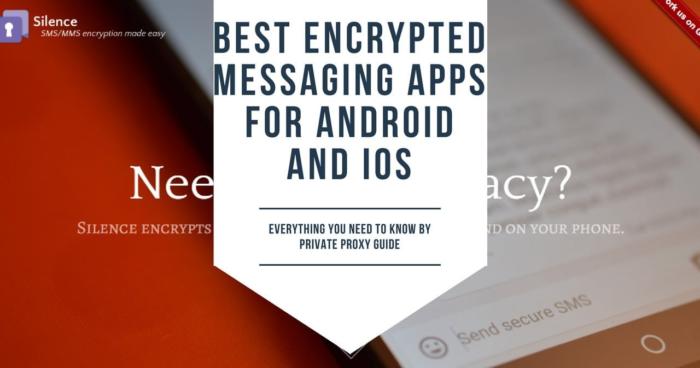
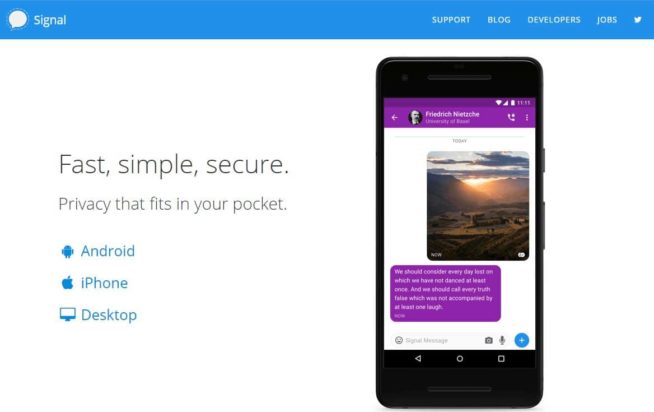
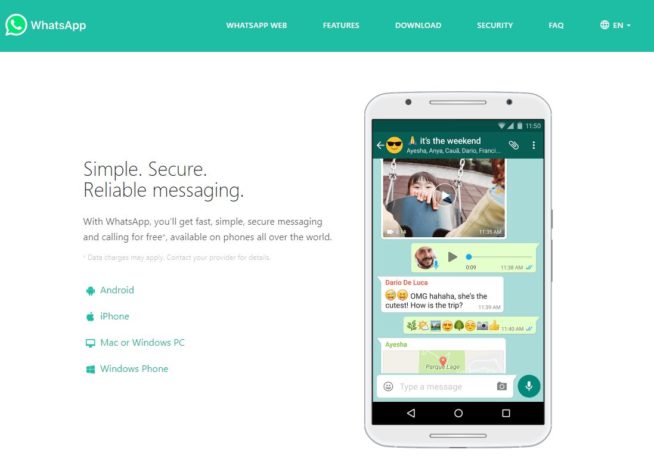
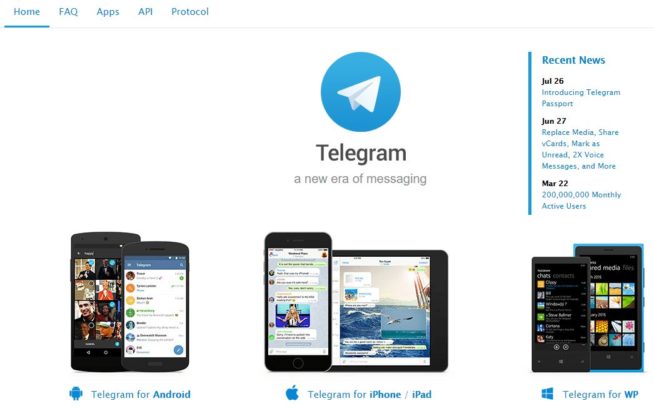

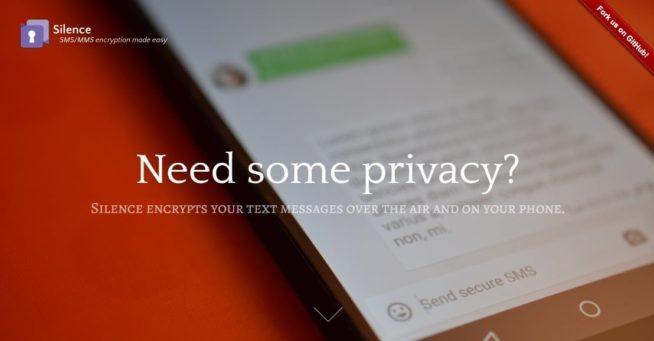
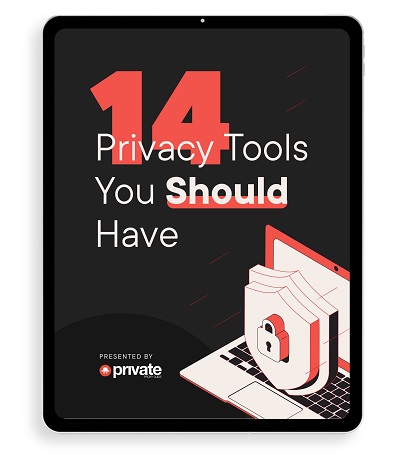

![Best VPN for Telegram [year]: Secure Messaging and Privacy Best VPN for Telegram](https://www.privateproxyguide.com/wp-content/uploads/2021/10/Best-VPN-for-Telegram-150x150.jpg)
![Best VPN for WhatsApp [year]: Secure Messaging and Privacy Best VPN for Whatsapp](https://www.privateproxyguide.com/wp-content/uploads/2022/01/Best-VPN-for-Whatsapp-150x150.jpg)

![10 Best Parental Control Apps for iPhone, iOS & Android [year] best parental monitoring apps for iphone](https://www.privateproxyguide.com/wp-content/uploads/2021/03/best-parental-monitoring-apps-for-iphone-150x150.jpg)
![Best Note-Taking Apps for Android in [year] – Top Picks Best Note-taking Apps for Android 2021 - Free & Paid](https://www.privateproxyguide.com/wp-content/uploads/2019/10/Best-Note-Taking-Apps-for-Android-150x150.jpg)
![Best Antivirus Apps for iPhone & iOS Security [year] best antivirus for iphone ios](https://www.privateproxyguide.com/wp-content/uploads/2021/03/best-antivirus-for-iphone-ios-150x150.jpg)
![Best Cloud Storage Apps for iPhone [year] Free & Paid Best Cloud Storage Apps for iPhone](https://www.privateproxyguide.com/wp-content/uploads/2021/02/Best-Cloud-Storage-Apps-for-iPhone-150x150.jpg)

![Best Spy Apps for iPhone & Android [year] Top Choices Best Spy Apps for iPhone and Android](https://www.privateproxyguide.com/wp-content/uploads/2021/11/Best-Spy-Apps-for-iPhone-and-Android-150x150.jpg)
![Best Free & Paid Android VPN [year]: Fast & Secure Apps Best VPN for Android](https://www.privateproxyguide.com/wp-content/uploads/2022/03/Best-VPN-for-Android-150x150.jpg)
Secure communication can only be in a decentralized utopia ecosystem. The ecosystem works on the principle of mesh networks, so the location cannot be tracked.
I will agree with Utopia p2p messenger, it also has a mobile version already: https://play.google.com/store/apps/details?id=is.u.utopia It’s in a beta stage for now, but we were waiting for it for too long. So welcome all to test a really encrypted messenger.
Ethan, btw, have you seen they released a mobile version already? https://play.google.com/store/apps/details?id=is.u.utopia It’s in a beta test stage now, but we were waiting for it for too long. Say hi to decentralization and web 3.0. Nothing else can provide you the same level of encryption.